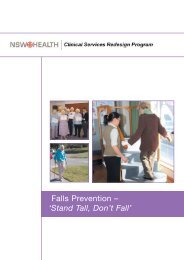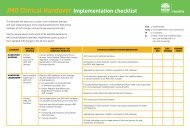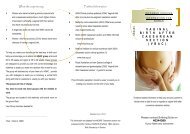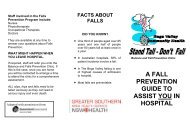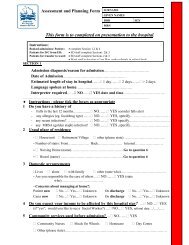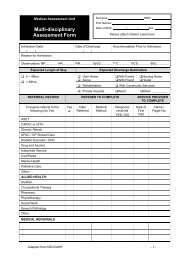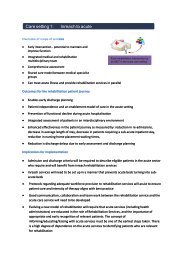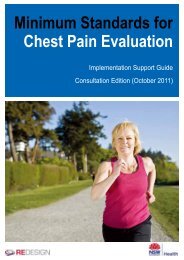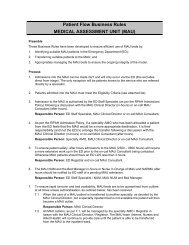A review of literature, 2006 ( pdf - 438 KB) - ARCHI
A review of literature, 2006 ( pdf - 438 KB) - ARCHI
A review of literature, 2006 ( pdf - 438 KB) - ARCHI
Create successful ePaper yourself
Turn your PDF publications into a flip-book with our unique Google optimized e-Paper software.
Macedonian Women’s Health Project<br />
Review <strong>of</strong> <strong>literature</strong><br />
___________________________________________________________________<br />
Background<br />
This section includes some information on the country <strong>of</strong> Macedonia, its history,<br />
patterns <strong>of</strong> migration to Australia and some aspects <strong>of</strong> Macedonian culture to provide<br />
a broader understanding <strong>of</strong> the factors that may influence the health and wellbeing <strong>of</strong><br />
Macedonian women in south eastern Sydney.<br />
Macedonia<br />
The Republic <strong>of</strong> Macedonia is located on the Balkan Peninsula in southern Europe.<br />
Macedonia is landlocked, surrounded by Serbia in the north, Greece in the south,<br />
Bulgaria to the east and Albania in the west. The republic <strong>of</strong> Macedonia has a<br />
population <strong>of</strong> just over two million people in an area <strong>of</strong> 67,741 square kilometres.<br />
The capital city <strong>of</strong> Macedonia is Skopje which is in the northern part <strong>of</strong> country on the<br />
Vardar River. Macedonia is a mountainous country with small basins <strong>of</strong> agricultural<br />
land linked to rivers leading to the Aegean Sea. The interior <strong>of</strong> Macedonia has a<br />
moderate continental climate with warm summers and cold wet winters (Macedonian<br />
Australian Welfare Association 2004).<br />
The <strong>of</strong>ficial language spoken in Macedonia is Macedonian. The Macedonian<br />
alphabet is a distinct alphabet called Cyrillic. The Cyrillic alphabet (with some minor<br />
distinctions) is also used in other countries such as Russia, Bulgaria, Serbia, Bosnia,<br />
Montenegro, Ukraine, Mongolia and in other central Asian republics.<br />
History<br />
For much <strong>of</strong> its history Macedonia has been occupied, divided and dominated at<br />
various times by the Roman, Byzantine, Serbian, Bulgarian and Ottoman empires. In<br />
the 1912–1913 Balkan Wars, Serbia, Greece, and Bulgaria formed alliances which<br />
resulted in Macedonia being discharged from the Turkish rule. Consequentially the<br />
victors each annexed parts <strong>of</strong> Macedonia.<br />
In 1944 Vardar Macedonia entered the Yugoslav Federation whereas the southern<br />
part (Aegean Macedonia) stayed with Greece. In 1991 when Yugoslav Federation<br />
was dissolved, Vardar Macedonia became known as the Former Yugoslav Republic<br />
<strong>of</strong> Macedonia (Thomas 2001).<br />
Following the break up <strong>of</strong> Yugoslavia, however, the Australian Bureau <strong>of</strong> Statistics<br />
did not provide a separate category for people from Macedonia in the census until<br />
1996; Macedonians were categorised as ‘Yugoslav’ , ‘Greek’ (Macedonian Australian<br />
Welfare Association 2004) and ‘Slav’ (Najdovski 1997) thereby underestimating the<br />
number <strong>of</strong> Macedonians in Australia. The Australian government still <strong>of</strong>ficially uses<br />
the term ‘Former Yugoslav Republic <strong>of</strong> Macedonia’ in preference to ‘Republic <strong>of</strong><br />
Macedonia’ as used by Macedonians themselves.<br />
In the late1990s Macedonia was faced with an escalation <strong>of</strong> ethnic conflicts between<br />
the Macedonian and the ethnic Albanian population (Copic 2004). The North Atlantic<br />
Treaty Organisation’s (NATO) failure to disarm and disband the Albanian Kosovo<br />
Liberation Army resulted in a major security threat for Macedonia. A full-scale war did<br />
- 4 -




